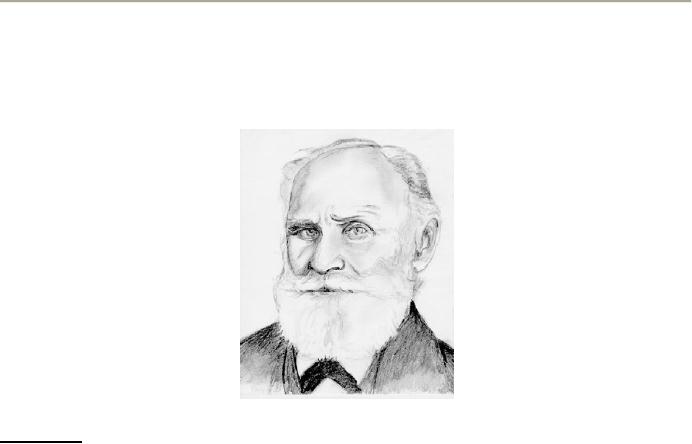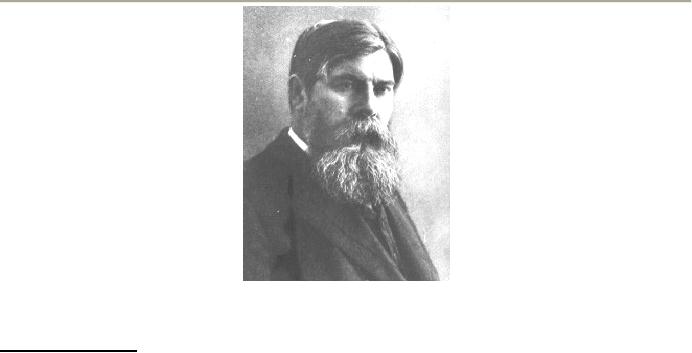 |
RUSSIAN CONTRIBUTIONS:Vladimir Bekhterev |
| << RUSSIAN CONTRIBUTIONS:Ivan Pavlov, Reflex, Acquisition |
| IMPACT OF PHYSICAL SCIENCES ON PSYCHOLOGY:Charles Darwin, Gustav Fechner >> |

History
and Systems of Psychology
PSY502
VU
Lesson
12
RUSSIAN
CONTRIBUTIONS
Ivan
Pavlov (1849-1936)
Ivan
Pavlov
Ivan
Pavlov is one of the greatest
psychologists of the 20th century whose ideas
left a long lasting
impact
on the field. The importance of Pavlov's
discoveries can be gauged
from the fact that his
theories, as
they
emerged from his
experiments, are today applicable to a
very large area of psychology,
including:
Animal/comparative
psychology
o
Child
psychology
o
Educational
psychology
o
Organizational
psychology
o
Industrial
psychology
o
Sport
psychology
o
Psychology
of advertising
o
Clinical/Abnormal
psychology
o
Psychotherapy
o
That
is the magnanimity of the impact of Pavlov's
discoveries on modern psychology.
29

History
and Systems of Psychology
PSY502
VU
Vladimir
Bekhterev (1857-1927)
Vladimir
Bekhterev
Another
contributor from Russia
whose name deserves to be mentioned is
Vladimir Bekhterev. He
was
born in 1857 and died in
1927. He studied under Wilhelm
Wundt, the psychologist who
established the
first
psychological laboratory at Leipzig,
Germany.
One
of the major contributions of Bekhterev is his
experiments on animals and
humans using mild
electric
shocks. In other words, Bekhterev
used electric shocks of low
voltage which were not
harmful, for
humans
and animals. He then noted
the response of the organisms to the
shocks. The idea behind
this
experiment
was to trace the effect on learning. Bekhterev
noted that shocks are
associated with
withdrawal
reaction.
Withdrawal reaction means that humans
and animals tend to move away
from the source of the
stimulus.
In other words, the action of the
organism is to avoid the stimulus
which was felt harmful by
the
body.
It therefore moved away. This response
was called Associative
reflex by Bekhterev. He stated
that
associative
reflex was learning which
was similar to learning by conditioning
as given by Pavlov.
Another
contribution of Bekhterev is that he gave
the idea of physical energy to explain
the
phenomenon
of consciousness. He proposed that
consciousness is a form of physical
energy. The energy
resulted
in the person being aware of himself and
his surroundings. He further
stated that all
higher
psychological
functions such as thinking
and generation of ideas are the forms of
expression of physical
energy
which represented the
consciousness.
30
Table of Contents:
- INTRODUCTION:Methodology, Grading, Course Overview up to Midterm
- ANCIENT GREEK PHILOSOPHY/PSYCHOLOGY:Socrates, Plato
- GREEK THINKERS:Aristotle, Contiguity, Contrast
- PSYCHOLOGY IN THE 5TH TO 12TH CENTURY:Saint Augustine, Avicenna
- PSYCHOLOGY IN THE 5TH TO 12TH CENTURY:Al-Ghazali, Ibn-Rushd, Averroes
- RENAISSANCE:Rene Descartes
- ASSOCIATIONISTS:Thomas Hobbes, John Locke
- ASSOCIATIONISTS:David Hume, FRENCH REVOLUTION, Denis Diderot
- GERMAN CONTRIBUTION:Wilhelm Liebniz, Immanuel Kant, Friedrich Hegel
- INDUSTRIAL REVOLUTION:RUSSIAN CONTRIBUTIONS
- RUSSIAN CONTRIBUTIONS:Ivan Pavlov, Reflex, Acquisition
- RUSSIAN CONTRIBUTIONS:Vladimir Bekhterev
- IMPACT OF PHYSICAL SCIENCES ON PSYCHOLOGY:Charles Darwin, Gustav Fechner
- STRUCTURALIST SCHOOL OF PSYCHOLOGY:Wilhelm Wundt
- FUNCTIONALISM:William James, John Dewey
- EUROPEAN FUNCTIONALISTS:David Katz, Edgar Rubin, Jean Piaget
- BEHAVIORISM:Edward Lee Thorndike, Law of belongingness
- BEHAVIORISM:Albert Weiss, Edwin Holt, Learning, Canalization, Walter Hunter
- BEHAVIORISM:J.B.Watson
- NEO-BEHAVIOURISTS:Clark Hull, Edward Tolman, Edwin Gutherie
- NEO-BEHAVIORISTS:B.F. Skinner, Karl Lashley, Donald Hebb, Hobart Mowrer
- GESTALT PSYCHOLOGY:Max Wertheimer, Similarity, Proximity, Closure
- GESTALT PSYCHOLOGY:Wolfgang Kohler, Kurt Koffka, Edward De Bono
- GESTALT SCHOOL AND DYNAMIC PSYCHOLOGY:Kurt Lewin, DYNAMIC PSYCHOLOGY
- HISTORICO-EVOLUTIONARY PSYCHOLOGY:Leon Vygotsky, Sergei Rubenstein
- HISTORICO-EVOLUTIONARY PSYCHOLOGY:Alexei Leontiev, K.M Bykov
- SCIENTIFIC LOOK AT MENTAL DISORDERS
- SCIENTIFIC LOOK AT MENTAL ILLNESS:Philippe Pinel, Sameul Tuke
- SIGMUND FREUD AND THE PSYCHOANALYTIC MOVEMENT:The Superego
- SIGMUND FREUD AND PSYCHOANALYTICAL MOVEMENT:Anna Freud
- CARL JUNG AND ANALYTICAL PSYCHOLOGY:Carl Gustav Jung
- JUNG’S ANALYTICAL PSYCHOLOGY:Carl Gustav Jung
- ALFRED ADLER AND INDIVIDUAL PSYCHOLOGY:Alfred Adler
- NEO-FREUDIANS:Harry Stack Sullivan, Karen Horney
- NEO-FREUDIANS:Karen Horney, Erich Fromm
- ERIKSON and MORENO:J.L. Moreno, Protagonist, Audience, Role playing
- HUMANISTIC PSYCHOLOGY:Abraham Maslow, Carl Rogers, Positive Psychology
- MODERN TRENDS IN PSYCHOLOGICAL TREATMENT
- MODERN TRENDS IN PSYCHOLOGICAL TREATMENT:Biological Approaches
- ANTI-PSYCHIATRY MOVEMENT:D.L. Rosenhan, R.D. Laing, Aaron Esterson
- PSYCHOLOGY IN THE THIRD WORLD:Frantz Fanon
- PSYCHOLOGY IN THE THIRD WORLD CHINA AND PAKISTAN
- PSYCHOLOGY IN THE 21st CENTURY
- PSYCHOLOGY IN THE 21ST CENTURY:Consumer Psychology
- PSYCHOLOGY IN THE 21ST CENTURY:Sports Psychology, Positive Psychology